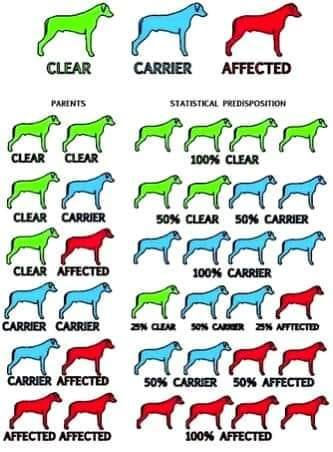Inbreeding, Linebreeding & Outcrossing
- krobison06
- Aug 22, 2025
- 3 min read
I've had people ask me about a puppy they are considering purchasing from another breeder and closer inspection shows that the parents are half siblings, father to daughter, or mother to son. While these breedings are too close for my comfort, it's a type of breeding that many do and has been done for decades. All individual breeds started with a small gene pool to set the characteristics that created the breed so in the long view, all breeds are inbred. Even within the Miniature Schnauzer breed, there is a bottleneck of genetics that essentially takes all of them back to three main stud dogs.
According to a company called Embark that provides DNA testing for breeders, the average "coefficient of inbreeding" or COI, for the Miniature Schnauzer breed runs around 26%. All of my breeding dogs are tested through this company and I have numbers ranging from 28% to 49%. Yet if I look at a 5 generation pedigree on my dogs, many times there are no common ancestors. I believe that the reason Embark's average for the breed runs so low is because many of the breeders that use Embark are the same breeders that are breeding for parti/liver/merle/toy and all of those dogs have been crossed with another breed fairly recently which will lower the amount of homozygous genes which is what they use to determine the percentage.
The thing to realize with inbreeding is that it will bring out the best and worst because it will double up on traits that are there genetically but that only get expressed when they come from both parents (see the "Short lesson on genetics" in another post). So if those parents are exceptional with no hidden issues, then the puppies should be exceptional. Any bad traits within the pedigree that are not expressed could come to the forefront in the puppies. However, this can happen when dogs are not closely related as well since all breeds have issues that are common within the breed that were probably carried within the founding dogs. So outcrossing (breeding two dogs of the same breed that do not appear to be related according to their pedigree) is more palatable to people because inbreeding is morally gross to them but does not always necessarily mean that the offspring are more likely to be healthy. Those dogs that appear to be unrelated could be carrying the gene for the same defect that comes from a common dog 12 generations back. As a carrier they are not expressing it but then when bred together it is doubled up which affects the offspring. All in all, breeding is a crapshoot! Two healthy individuals, whether related or not, can produce unhealthy puppies.
If you're considering a puppy from a very close breeding, you should definitely be asking about the health and temperament of those common ancestors as well as other offspring and whether or not this breeding has been done before and what the results were and the age of those puppies. Why did they choose to do this close breeding? Was it intentional where they hoped to produce outstanding dogs as similar to that common ancestor as possible? (good answer) Was it an accidental breeding that they are just trying to make the best of? (sh*t happens and honesty is the best policy) Or was it just a case of convenience where they own both dogs and it was easier/cheaper than finding another male to breed to? (FYI - this answer would immediately turn me away from this "breeder")
Take all answers with a grain of salt though. #1, is the breeder being truthful with those answers? #2, so much in the Miniature Schnauzer suspects a genetic basis but has an external catalyst (first to my mind is diet when you think of certain types of bladder stones, diabetes, or pancreatitis) so if there are reports of things like that, you have to take into consideration that many people do not feed them properly and let them get obese. And while the breed as a whole is known to have a higher incidence rate, all dogs are susceptible. I would be more concerned with things such as Liver Shunts or Epilepsy, (both are suspected genetic) or even dog aggression since base personality traits are inheritable. However, temperament is routinely man made with bad handling so again, it needs to be taken with some of that in mind.
I can't tell you whether or not to get that puppy. I know of some outstanding dogs that are very closely bred according to their pedigree with no issues and I know of some horribly afflicted dogs that have no common ancestors in their pedigree. Some of it would also depend on how much I trusted the breeder and what kind of health warranty they provide.




